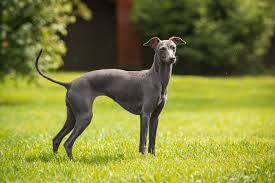
Greyhound
Conditions of detention
Greyhounds are adaptable and can live comfortably in various settings, including apartments, provided they get enough exercise. They enjoy lounging indoors and require a soft, comfortable place to rest.
Useful Fact: Despite their reputation as racing dogs, Greyhounds are known as “40 mph couch potatoes” because they enjoy relaxing and are relatively low-energy indoors.
Nutrition and diet
A balanced diet of high-quality dog food, appropriate for their age, size, and activity level, is crucial. Given their athletic nature, they may benefit from a diet rich in lean protein.
Useful Fact: Feeding Greyhounds smaller, more frequent meals can help prevent bloat, a condition to which they can be prone.
Health
Greyhounds are generally healthy dogs but can be prone to certain conditions such as hip dysplasia, bloat, and heart disease. Their thin skin also makes them more susceptible to cuts and abrasions.
Useful Fact: Regular veterinary check-ups and maintaining a healthy weight through proper diet and exercise are essential for their well-being.
Grooming and care
The Greyhound has a short, smooth coat that requires minimal grooming. Weekly brushing to remove loose hair and occasional baths are usually sufficient.
Useful Fact: Due to their thin skin, Greyhounds may need protection from extreme temperatures, such as coats in winter and sunscreen in summer.
Education and training
Greyhounds are intelligent and respond well to positive reinforcement training methods. They are generally easy to train but can be sensitive, so gentle handling is crucial.
Useful Fact: Early socialization and basic obedience training are important to help them adapt to various environments and prevent shyness or fearfulness.
Toys and entertainment
Greyhounds enjoy toys that engage their hunting instincts, such as squeaky toys, balls, and lure coursing activities. Interactive toys can also provide mental stimulation.
Useful Fact: Due to their strong prey drive, supervised play is important, especially with smaller pets.
Safety
A secure, fenced yard is important for Greyhounds to prevent them from chasing after small animals. They should always be on a leash in unfenced areas due to their speed and prey drive.
Useful Fact: Greyhounds have thin skin that is easily injured, so avoid rough play and ensure their environment is safe.
Accessories
Durable, comfortable collars and leashes are necessary for Greyhounds. Soft, padded bedding is also important to support their joints.
Useful Fact: Martingale collars are often recommended for Greyhounds because their necks are larger than their heads, making it easier for them to slip out of regular collars.
Socialization
Early socialization with other dogs, animals, and people is crucial to develop a well-rounded temperament. Greyhounds are generally friendly and enjoy companionship.
Useful Fact: Introducing Greyhounds to various environments and experiences can help prevent anxiety and promote a confident, well-adjusted demeanor.
Travel and Transportation
Greyhounds typically travel well, especially if accustomed to car rides from a young age. Secure travel crates or dog seat belts enhance safety during transportation.
Useful Fact: Providing a comfortable, familiar blanket or toy can help reduce anxiety during travel.
Behavior and psychology
Known for their gentle and calm nature, Greyhounds form strong bonds with their families. They are independent but enjoy companionship and can suffer from separation anxiety if left alone for long periods.
Useful Fact: Regular exercise, mental stimulation, and positive social interactions contribute to their overall well-being and happiness.
Legal aspects
Owning a Greyhound may be subject to local pet laws and regulations, including licensing and leash laws. Greyhounds from racing backgrounds may have specific adoption requirements.
Useful Fact: Being aware of and adhering to local regulations ensures responsible pet ownership and avoids legal issues.


